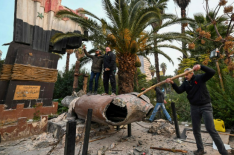The Fall of a Regime: Syria’s Road to Rebuilding
- Muhammad Isa Bin Saif
- Dec 10, 2024
- 4 min read
In the early hours of the 8th of December 2024, Syrian rebels under the group Hayat Tahrir
al-Sham (HTS) entered and celebrated the capture of the Khalid Ibn Al-Walid mosque in
Damascus, marking the end of a 13-year-long civil war and a 53-year-long authoritarian regime led first by Hafez Al-Assad, then by his son, Bashar Al-Assad. The now Ex-president is said to have fled the country at 22:00 the day before, to an unknown location. This turning point offers the nation a chance to rebuild after decades of division and devastation. However, the road ahead is most definitely fraught with seemingly unconquerable challenges, demanding not only significant domestic resolve but also a great deal of global support.

Assad’s rise to power in the year 2000 following his father’s presidency, despite being thought of as a relief from the dictatorship brought by his father, cemented a dynasty that ruled Syria with an absolute iron fist. Under his rule, Syria, at first, appeared stable with many economic reforms but was soon plagued by systemic corruption, human rights abuses, and growing inequality between Sunni and Shia Muslims. The infamous Arab Spring of 2011 ignited nationwide protests against his regime, leading to a violent and indiscriminate crackdown and a devastating civil war. Over the years that followed, foreign powers, including Russia, Iran, Turkey, and the US, had pivotal and opposing roles in shaping the conflict and leading to the creation of ISIL. The ruthless regime persisted for years despite economic sanctions, international condemnation, and widespread internal opposition. The eventual collapse seen in the past few days came from a combination of military defeats, economic implosion, and waning support from international allies.
In the remnants of the once all-powerful authoritarian rule, Syria faces an uncertain yet hopeful future. The power vacuum left by Assad’s toppling has created opportunities for major and permanent democratic reform, yet also risks even further instability, as fears of an ISIS reignition grow. Infrastructure across the country is in utter ruin. Major cities like Aleppo and Raqqa are still struggling to recover from years of bombardment and destruction. A staggering 50 percent of Syria’s population remains displaced, either internally or as refugees abroad, namely in Türkiye and the EU. On an economic note, Syria is grappling with severe hyperinflation and a collapse of essential social services. The immediate priority for any interim leadership should most definitely be restoring basic governance, security, and trust among the people.
As a result, the road to recovery is both arduously long and incredibly complex. Judicial independence with no corrupt influence, severely eroded under Assad, must immediately be re-established to ensure accountability and rebuild trust amongst the people. Political factions, including both opposition groups and regional powers, need urgently to cooperate to prevent sectarianism, as seen in history, or extremist groups like ISIS from regaining influence in significant areas of the nation. Humanitarian aid is severely critical as millions of Syrian civilians face daily food insecurity and lack critical access to healthcare. Education and employment opportunities are equally vital for rebuilding a stable and thriving society. The challenge, in this case, is not only to rebuild a country, infrastructure-wise, but also to heal a fractured and divided society.

Amid the complete chaos left in the wake of the revolution, Syrians are now expressing a mix of relief and apprehension. A resident of Damascus said, “We’ve waited years for this, but now we need peace, not more fighting.” All the while, refugees in Jordan and Türkiye have voiced cautious optimism, seemingly hopeful to return yet uncertain about safety and future opportunities. Meanwhile, activists are stressing the importance of ensuring justice and reparations for the innumerable lives and livelihoods lost during Assad's rule.
The international response to the toppling of the regime has been understandably highly mixed, with Western countries and human rights organizations seeing it as a long-needed victory for democracy. On the other hand, key powers like Russia and Iran, strong supporters of the regime, are adjusting and recalibrating their strategies in the region, overall. The UN has already called for immediate and widespread international cooperation to stabilize the region of Syria and has emphasized the need for free and fair elections, a strong contrast to the state of affairs prior. Neighbouring countries, who have already been overwhelmed by refugee crises, are now urging swift and conclusive action to enable the safe return of displaced Syrians.
A recent development to the state of affairs: Israeli tanks have already crossed the Syrian-Israeli border fence for the first time in 50 years to deter Syrian rebels from taking back the priorly seized, controversial Golan heights. Additionally, suspected Israeli missiles have hit parts of civilian areas in Damascus as well as Syrian Air-Defence bases and ammunition depots in the South. The IDF has said these operations were conducted in order to repel possible, future Syrian attacks.

To culminate, the fall of Assad's regime marks both an end and a beginning for Syria, offering a chance to rebuild the nation on the premise of justice, democracy, and unity. Achieving this requires not only the unwavering resolve of Syrians but also united global support, showcasing resilience and the strength of collective action.
Image Sources
Middle East Eye. “Syrian rebels enter Khalid Ibn al-Walid Mosque,” December 8, 2024.
Anadolu Agency. “Assad Statues Torn Down as Syrians Reclaim Streets.” Daily Sabah, December 8, 2024.
https://www.dailysabah.com/world/syrian-crisis/assad-statues-torn-down-as-syrians-reclaim-streets.
Jazeera, Al. “Israel Grabs Land in Syria’s Golan Heights, Warns Villagers to Stay Home.” Al Jazeera, December 8,
2024.

Comments